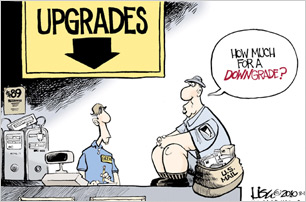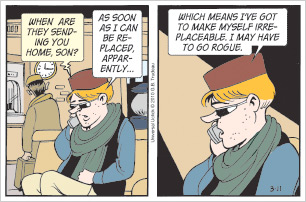
Make My RSS Feed Full, Goddamnit!Or please, Mr. Denton, will you undo the damage you've done to Gawker Media?
Posted Thursday, March 11, 2010, at 5:57 PM ETWhen Gawker Media truncated its RSS feeds a couple of days ago from full text to one-paragraph teasers and an invitation to click through to the whole article on the Web, Reuters blogger Felix Salmon resurrected his argument from 2007 to chastise Gawker boss Nick Denton for the new abbreviations.
Denton responded briefly to his critics, citing the need to get readers to click through to the Gawker sites where the ads are served and the money collected. Boiled down, Salmon loves full-text RSS feeds because they give him an efficient, aerial view of Web content. Plus, he believes that satisfying RSS devotees pays back dividends, pointing to the Guardian's testimonial that its switch to full-content RSS feeds in 2008 contributed to the site's growth in monthly unique users over the past 18 months from 25 million to 37 million.
My research on the topic is completely anecdotal, but I can tell you this: If not for full-text RSS feeds, my online reading would probably fall by half. I depend on RSS feeds to alert me to when new copy has gone live, to help me organize my reading, and to give me a way to archive pieces that I'll want to revisit. Oh, the RSS experience could be lots better. My colleague John Dickerson wishes he could color-code what comes into his Google Reader, filter out copy he doesn't want to see by keyword, and add visual clues like icons to his results, and I agree. But for hardcore readers, RSS makes reading copy on the Web seem like climbing the Grande Aiguille du Dru with a mule and a sack of anvils strapped onto your back.
Reading the Web wasn't always such a chore. Back in the old days, publishers didn't break pieces into multipage units, and they didn't bombard you with navigation bars and refers pointing to other stories. There were no earsplitting auto-play advertisements to shock you out of your seat, and there was no need to install ad blockers. No thicket of toolbars and buttons offering the options to print, discuss, e-mail, or recommend the piece to Facebook, Twitter, Digg, or Reddit stood in your way of reading a story. You could actually read and maneuver your way to piece after piece without being assaulted. At the rate that we're going, soon there'll be no room for articles on Web pages, just ads and navigation and headlines and pointers to social media venues where you can "share" the cacophony!
So absolute is my commitment to RSS feeds that a few years ago when Slate backburnered its plan to add them, I started hand-building my own for the Press Box column using IceRocket's simple tool. I'm slightly ashamed to admit that my hand-built feeds were truncated, too, but I didn't have the rights to post complete copy. When Slate finally crossed the RSS Rubicon, it took a Denton-esque truncation stand, which it still holds. But this retrograde strategy is not companywide, giving us hope that someday Slate will see the light. Our sister site The Big Money offers full-text RSS! This makes finding and reading my very favorite TBM writers (Marion! Chadwick! Matt! Kevin!) a delight, not a job. (Don't tell the boss, but if not for TBM's RSS feed, I doubt that I would struggle through its navigation and frenetic pagination very often.)
The booklike purity of RSS accounts for its suppression. Even though ads can be served on RSS pages, publishers prefer focusing sales on the familiar real estate of their colorful and flashy Web sites. (James Ledbetter explores the business plus and minuses of RSS feeds in a smart 2009 piece for The Big Money.) Web publishers—even bomb-throwers like Denton—fear the RSS audience the same way the broadcasters fear viewers who own DVRs. Having created all this "free" content, publishers and broadcasters believe that readers have a moral obligation to sit through the flashing of strobe lights and the banging of pots and pans, and that they have no alternative but to endure the punishment.
Complaining about truncated RSS feeds is probably as futile as campaigning against the incoming tide. And yet hope exists. Since Denton truncated RSS feeds, I've switch from reading his gadget blog, Gizmodo, and taken up with its equal, Engadget, which still offers full-text RSS. Gawker's RSS philosophy can only drive traffic to competing sites that provide full-text, such as The Awl. (Yes, I know there is a "secret" RSS VIP feed to Gawker, but I refuse on principle to use it. Or at least admit to using it.)
I can't calculate whether any of the success of Twitter and Facebook can be attributed to the fact that the news feeds their users generate strip out the noise and clutter of the 2010 Web experience, taking you directly to stories and pages you may want to visit. But I'll bet it's not small. Ever notice how many of the links are to the ad-free "print" pages or "single-page" view of the article? Every time a reader forwards one of those links rather than the Web publisher's preferred link, he's striking a blow against clutter and frustration.
on the Fray
-
Slate's 80 over 80 loses a centenarian http://bit.ly/96jzp9
-
The top 10 funniest scientific paper titles http://bit.ly/9fGIg0
-
New Jersey guy arrested in Yemen tries to shoot his way out of the hospital http://nyti.ms/drmIJa
 We Don't Give Nearly Enough Credit to the Scientists Who Invent New Types of Birth Control
We Don't Give Nearly Enough Credit to the Scientists Who Invent New Types of Birth Control What Does Whale Meat Taste Like?
What Does Whale Meat Taste Like? Help! I Want To Propose, but I Can't Afford the Ring My Girlfriend Is Demanding.
Help! I Want To Propose, but I Can't Afford the Ring My Girlfriend Is Demanding. Try the New Slate iPhone App
Try the New Slate iPhone App Green Zone Does for the Iraq War What Inglourious Basterds Did for World War II
Green Zone Does for the Iraq War What Inglourious Basterds Did for World War II Some Thoughts on Charlotte's Web … From Wilbur the Pig
Some Thoughts on Charlotte's Web … From Wilbur the Pig














